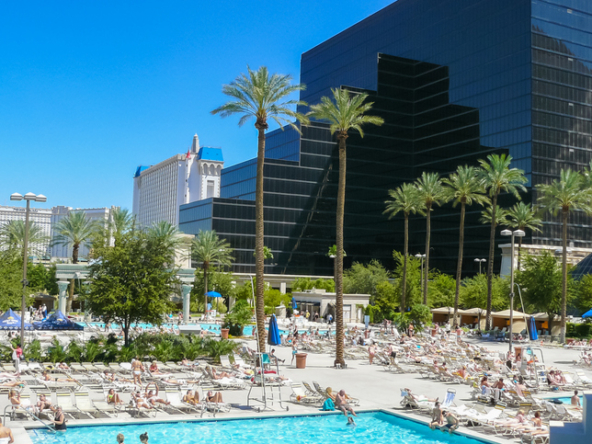The short-term rental industry, spearheaded by companies like Airbnb, has been on the rise across the country since approximately 2008. Notably, for Airbnb, in just 12 years, the company has grown from nothing to an over 30 Billion industry. Critics and opponents of short-term rentals and Airbnb argue that the rise in popularity of short-term rentals come at the expense of urban life for nearby residents.
As a result, cities across the country are looking for ways to regulate the short-term vacation rental industry, including popular vacation cities, like Las Vegas. Many people, mostly out of towners, do not realize that short-term residential rentals are illegal in unincorporated Clark County. Though, the city of Henderson, North Las Vegas, and Las Vegas allow them with specific restrictions. Even though Airbnb’s are illegal in most of the Las Vegas area, Airbnb says that rentals in and around Las Vegas increased 19% last year compared with a year earlier. This suggests that the majority of property owners are ignoring recently implemented laws and still renting their property on Airbnb and similar platforms illegally.
So, what exactly are the rules in each area regarding Airbnb rentals? Since Airbnb and other short-term vacation rentals in Southern Nevada face different rules in different municipalities, we will break down each area below. Click here for the Clark County Area Map.
Unincorporated Clark County Info
Short-term residential rentals are outright illegal in unincorporated Clark County. Short-term vacation rentals are illegal in the unincorporated county. The violation is punishable by a $1,000 per day fine. Fines are levied once code enforcement determines that a house is operating as a vacation rental. If owners are found to violate the law, they can file a complaint against the property owner at the Clark County Code Enforcement Office or online.
The City of North Las Vegas Info
On October 21, 2020, the City of North Las Vegas adopted Ordinance 3040 (Short-term Rentals). Explicitly, the ordinance allows property owners to operate short-term rental as long as they have the approval of a Conditional Use Permit (CUP). Before applying for a business license, the applicant must have an approved CUP. During the first sixty (60) days, existing owners can provide proof of ownership of the residence for at least one (1) year before October 21, 2020, and apply to be “grandfathered” in. After December 21, 2020, a 660 ft separation between short-term rental units will be required in North Las Vegas.
The City of Henderson Info
On July 16, 2019, the City Council of the City of Henderson adopted and approved ordinances that permit short-term vacation rentals. However, in order to comply, property owners who operate a short-term vacation rental within the City of Henderson must register with the city annually and comply with all other city regulations. On November 17, 2020, the city adopted additional, stricter changes for the operation of short-term vacation rentals within the city.
Notably, there is a minimum two-night stay. Additionally, owners must take a class, have insurance, and give the city a note declaring that the short-term vacation rental is not violating their homeowner’s association rules. Notably, property managers who are licensed are exempt from these rules. The law also prohibits the use of short-term vacation rental for weddings, parties, or private events. Lastly, the owners must register their rental with the city, which is $820.00. The fee is per property and is due annually.
The City of Las Vegas Info
In Las Vegas, short-term vacation rentals, which is any rental that is rented for less than 30 days, are only allowed if the property owner has a council-approved business license. Specifically, homeowners can only rent out homes where they live and must pay an annual $500 licensing fee and a monthly hotel tax. In order to qualify for short term vacation rental status, the properties must also be owner-occupied. As such, owners are not permitted to rent out entire homes or apartments. Additionally, the rental must have no more than three bedrooms, and an owner cannot rent more than one short-term rental within a 660-foot radius.
Short Term Vacation Rentals Are A Nuisance
With nightclubs and many other public places closed because of the global Coronavirus (COVID-19) pandemic, police say short-term vacation rentals are increasingly used for parties and large gatherings.
According to the Nevada Current, In early August and September, Las Vegas Metro Police cautioned they are cracking down on illegal parties at short term vacation rentals after what they reported as a string of violent incidents. Obviously, this has increased frustrations amongst local homeowners during an already stressful time.
Interestingly, a review of public records indicates most short-term vacation rental owners are corporations and/or out-of-town investors. For example, in Henderson, of the 280 licensed short term vacation rental properties, 36 percent of the licenses are held by out of state investors, and 28 percent are owned by corporate entities.
Final Thoughts
Many people are operating short-term rentals illegally, hoping that they don’t get caught. The truth is that the Cities are watching the situation closely and are working with those short-term rental platforms like Airbnb, Vrbo, Expedia, etc., to catch violators. To that point, legislatures have promised to continue to tweak its ordinances to combat the short-term vacation rental industry if the current changes do not help regulate the industry better. The number of short-term vacation rentals within neighborhoods, stricter occupancy limits, regulating the use of backyard pools and spas, and reducing the number of time owners have to respond to complaints before neighbors may call the police are options that legislatures are considering implementing sometime in the future.
As mentioned above, the penalties for operating illegal short-term vacation rentals and Airbnb’s can be extremely high. Additionally, the liabilities are high as well. Neighbors file complaints all the time, sometimes even false complaints, to force you to shut down the business. In the end, it’s probably not worth it to operate illegal Airbnb’s in the Las Vegas area. Instead, it’s better for homeowners to familiarize themselves with the law and register their property per the regulations to limit their fines and liabilities.




